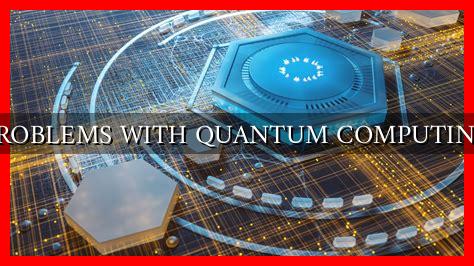Quantum computing stands at the confluence of theoretical physics, computer science, and engineering, promising to revolutionize information processing. Yet, despite its tantalizing potential, many fundamental challenges remain unresolved. This article elucidates some of the key unsolved problems in quantum computing, each posing intricate questions that challenge our understanding and capabilities.
1. Decoherence: The Quantum Curtain
Decoherence, a phenomenon induced by interaction with the environment, leads to the loss of quantum coherence. This transition from quantum to classical behavior is insidious, undermining the very principles of superposition and entanglement that quantum computing relies upon. How can researchers devise robust error-correction techniques to mitigate decoherence? Current methodologies like quantum error correction codes exist, but they require substantial overhead, necessitating a rethink of quantum fault tolerance.
2. Scalability of Quantum Systems
While small-scale quantum computers have demonstrated impressive feats, scaling these systems to handle complex real-world problems remains an elusive goal. What technological innovations are required to transition from laboratory prototypes to a commercially viable quantum architecture? The challenges include maintaining coherence, integrating qubits effectively, and ensuring operational stability. As more qubits are added, the interplay of errors also becomes more challenging, leading to questions about the thresholds of operational utility.
3. Quantum Algorithms: The Holy Grail of Computational Efficiency
The quest for quantum algorithms that outperform classical counterparts is ongoing. While Shor’s algorithm and Grover’s algorithm have showcased potential, many classes of problems remain unsolved regarding their quantum computational complexity. What new frameworks or approaches might unlock efficiencies in areas such as optimization, simulation, or machine learning? Researchers grapple with understanding which problems are inherently quantum-native and how to leverage quantum phenomena fully for practical applications.
4. Quantum Communication and Cryptography
Quantum key distribution represents a breakthrough in secure communication, yet questions linger about its practical implementation. How can quantum cryptography be scaled to protect vast amounts of data exchanged in modern networks? Furthermore, issues such as quantum repeater technology and the potential for quantum hacking raise critical concerns. The fundamental challenge lies in making quantum communication protocols robust against adversarial strategies while remaining user-friendly and cost-effective.
5. Material Limitations: Qubit Quality and Fidelity
Quantum systems rely heavily on the materials used to fabricate qubits. However, many materials suffer from limitations that impede the realization of high-fidelity operations. What breakthroughs in materials science can enhance qubit performance? The discovery of novel superconductors or topological materials might yield significant advances, yet this avenue is fraught with challenges that require interdisciplinary collaboration across physics and engineering domains.
6. Classical versus Quantum: The Resource Conundrum
The dichotomy between classical and quantum resources creates a layered complexity in computational methodologies. What exactly constitutes an optimal resource allocation in quantum versus classical paradigms? This question grows increasingly pertinent as large-scale quantum systems emerge. Understanding where quantum computing offers the most significant advantages will necessitate a comparative framework that transcends traditional performance metrics.
7. Interpretation of Quantum Mechanics: Philosophical Implications
The many interpretational frameworks of quantum mechanics—Copenhagen, Many-Worlds, pilot-wave theories—lead to profound philosophical implications for quantum computing. Does the interpretation of quantum mechanics influence the development of quantum algorithms? This challenge transcends pure computational considerations, inviting scrutiny into the very nature of reality as posited by quantum phenomena. Engagement with philosophical implications may yield insights that can shape future quantum technologies.
8. Interdisciplinary Integration: Bridging the Gaps
Quantum computing is inherently interdisciplinary, drawing insights from quantum physics, computer science, and even philosophy. How can educational paradigms evolve to nurture expertise across these domains? The future workforce must be equipped to tackle the multifaceted challenges of quantum computing, necessitating novel educational frameworks that promote comprehensive understanding and collaborative problem-solving.
9. Standardization and Benchmarking
As the quantum landscape evolves, the need for standardization in protocols and benchmarking for performance becomes paramount. How do we define success in quantum computing? Establishing widely accepted benchmarks will be crucial in ensuring meaningful comparisons across different quantum architectures and technologies. Without a common lexicon for progress, the industry risks fragmentation and inefficiency.
10. Ethical Considerations: The Societal Impact
The implications of quantum computing extend beyond technical challenges into the realm of ethics and society. What ethical frameworks must be employed to govern the deployment of quantum technologies? The potential for quantum computing to disrupt current paradigms of cryptography, data security, and artificial intelligence invokes a need for societal discourse around responsible innovation. The questions of accessibility and equitable advancement in quantum technologies must be addressed to prevent exacerbating existing disparities.
In conclusion, while quantum computing harbors immense potential, navigating its uncharted waters presents a plethora of challenges. From the fundamental physics of decoherence to the philosophical interpretations of quantum mechanics, the journey toward a fully operational quantum computing paradigm is laden with unsolved problems. Tackling these issues requires innovative thinking and interdisciplinary collaboration, inviting us to ponder the possibilities of the quantum realm while simultaneously addressing the complexities that arise.












